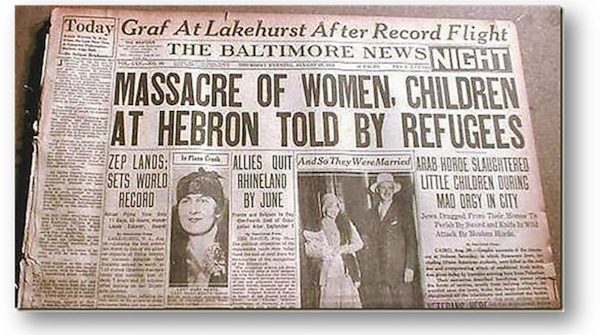Israel learned
The city of Hebron in Israel has been occupied territory for nearly a century. But not in the way everyone thinks Hebron is a Jewish city occupied by the Arabs. Hebron’s occupation began on a Friday evening in August ninety-three years ago when a group of Arab terrorists massacred the Jews of the city while the British who ruled over the Holy Land watched the killing happen while not lifting a finger to prevent the carnage.
Hebron was the first piece of land ever purchased by the Jews in Israel (they weren’t called Jews back then, they were Hebrews). Approximately 38 centuries ago, Abram (Abraham), the forefather of the Jewish faith, purchased a cave in Hebron to bury his beloved wife, Sarah. Abraham overpaid, so no one could deny it was his fair and square.

Above the Tomb of Sarah at the Cave of the Patriarchs
Israel learned
When Abe passed away, he was buried there also. Eventually, Abraham’s son Isaac, his wife Rebekah, Jacob, and one of his wives (Leah) were there. Jacob’s brother, Esau’s head, was also buried in the cave (long story). The Jews had owned the land in that city from that sale of the cave to Abraham until 1929. Jews were also the majority of the population most of that time.
Three days before the Hebron massacre, Davar newspaper of August 20th, 1929, reported: 
Incitement of feeling against the Jews goes on, particularly round Jerusalem and Hebron. Rumors are being spread by unknownpersons that on Saturday last the Jews cursed the Moslem religion and that it is the duty of Moslems to take revenge.
Rabbi Ya’acov Slonim, head of the Sephardic Jewish community, and Rabbi Frank, head of the Ashkenazic community, turned to the Arab Governor of Hebron, Abdullah Kardos. The Governor calmed us and said:
`There is no fear of anything happening. The British Government knows what it has to do. In the place where two soldiers are needed, it sends six.” And he added: “I tell you in confidence that they have many soldiers in the streets, in civilian clothes; these soldiers circulate among the crowds, and in the hour of need they will fulfill their duty.’‘
But that promise was never backed up with action.
“At about half past two on Friday (August 23) we saw a young Arab arrive by motorcycle from Jerusalem. He alarmed the Arab inhabitants of Hebron, saying that the blood of thousands of Moslems in Jerusalem was being shed like water. He called to the Arabs to avenge this blood. The unrest among the Arabs of Hebron was very strong, particularly after the motor cars began to arrive from Jerusalem with news of disturbances.”
On Friday night, August 23rd, Rabbi Ya’acov Slonim’s son invited any fearful Jews to stay in his house. The Rabbi was highly regarded in the community and had a gun. Many Jews took him up on this offer, and most of those Jews were murdered in his home.
On Saturday morning, before the slaughter began, the Rabbis again appealed to the Governor for help. Again they received the same empty assurances. Bewildered, the Jews turned to Mr. Cafferata, the British officer in charge of the Police. From him, too, they received assurances of safety.
As early as 8:00 a.m. on Saturday, the Jewish Sabbath, Arabs began to gather en masse. They came in mobs, armed with clubs, knives, and axes. While the women and children threw stones, the men ransacked Jewish houses and destroyed Jewish property. With only a single police officer in Hebron, the Arabs entered Jewish courtyards with no opposition.
Rabbi Slonim, who had tried to shelter the Jewish population, was approached by the rioters and offered a deal. If all the Ashkenazi yeshiva students were given over to the Arabs, the rioters would spare the lives of the Sephardi community. Rabbi Slonim refused to turn over the students and was killed on the spot. In the end,12 Sephardi Jews and 55 Ashkenazi Jews were murdered.
On hearing screams in a room I went up a sort of tunnel passage and saw an Arab in the act of cutting off a child’s head with a sword. He had already hit him and was having another cut, but on seeing me he tried to aim the stroke at me but missed; he was practically on the muzzle of my rifle. I shot him low in the groin. Behind him was a Jewish woman smothered in blood with a man I recognized as a[n Arab] police constable named Issa Sherif from Jaffa in mufti. He was standing over the woman with a dagger in his hand. He saw me and bolted into a room close by and tried to shut me out-shouting in Arabic, “Your Honor, I am a policeman.” … I got into the room and shot him.” (Bernard Wasserstein, The British in Palestine: The Mandatory Government and the Arab-Jewish Conflict 1917-1929, Oxford England, Basil Blackwell, 1991)
Now let me tell you about the massacre. Right after eight o’clock in the morning we heard screams. Arabs had begun breaking into Jewish homes. The screams pierced the heart of the heavens. We didn’t know what to do. Our house had two floors. We were
downstairs and a doctor lived on the second floor. We figured that we would be safe in the doctor’s apartment, but how could we get up there? The stairs were on the outside of the building, but it wasn’t safe to go out. So we chopped through the ceiling and that way we climbed up to the doctor’s house. Well, after being there only a little while, we realized that we were still in danger because by that time the Arabs had almost reached our house. They were going from door to door, slaughtering everyone who was inside. The screams and the moans were terrible. People were crying Help! Help! But what could we do? There were thirty‑three of us. Soon, soon, all of us would be lost.
Just then, God, blessed be He, in His great mercy, sent us an Arab who lived in back of our house. He insisted that we come down from the doctor’s apartment and enter his house through the back door. He took us to his cellar, a large room without windows to the outside. We all went in, while he, together with several Arab women, stood outside near the door. As we lay there on the floor, we heard the screams as Arabs were slaughtering Jews. It was unbearable. As for us, we felt that the danger was so great that we had no chance of coming out alive. Each one of us said his vidui [his confession in anticipation of death]. At any moment, we could be slaughtered, for double‑edged swords were already at out throats. We had not even the slightest hope of remaining alive. We just begged that it should already be done and over.
Five times the Arabs stormed our house with axes, and all the while those wild murderers kept screaming at the Arabs who were standing guard to hand over the Jews. They, in turn, shouted back that they had not hidden any Jews and knew nothing. They begged the attackers not to destroy their homes. Israel learned
 During the two-day-long massacre, sixty-seven Jews were killed, and another fifty-eight were injured.
During the two-day-long massacre, sixty-seven Jews were killed, and another fifty-eight were injured.
When the massacre finally ended, the surviving Jews resettled in Jerusalem. Some Jewish families tried to move back to Hebron but were removed by the British authorities in 1936 at the start of the Arab revolt.
n 1948, the War of Independence granted Israel statehood but further cut the Jews off from Hebron. The city was captured by King Abdullah’s Arab Legion and ultimately annexed to Jordan.
When Jews finally regained control of the city in 1967, a small number of massacre survivors again tried to reclaim their old houses. Then-defense minister Moshe Dayan told the survivors that if they returned, they would be arrested and that they should be patient while the government worked out a solution to get their houses back. Dayan never got around to it–I guess he was too busy giving away Jewish rights to the Temple Mount.
The Memorial of the Jews of Hebron, as submitted to the British High Commissioner of Palestine, closes with these tragic words:
In the name of sixty-five slaughtered, fifty-eight wounded, and many orphans and widows; in the name of the remnants of the plundered and tortured, we accuse:
-
-
The [British Mandatory] Government, which did not fulfill its duty and provide protection for its peaceful and defenceless charges.
-
The Governor, Abdullah Kardos, and the Commander, Cafferata, who deprived us of the means of appealing for help and defence, betrayed us with empty promises and gave the murderers and robbers their opportunity.
-
The police, which did not fulfill its duty and behaved with contemptible baseness.
-
The emissaries of the Mufti and the Moslem Council, in particular the Sheikh Talib Narka and his colleagues, those mentioned above, as well as those who have not been mentioned, who proclaimed the massacre and permitted murder and rape.
-
Also, the inhabitants of Hebron (with the exception of some families) who did not rise up to help their brothers and neighbors in accordance with the commandments of the Koran…
-
Israel learned

Some 93 years later, that memorial still rings true. Terrorists are still attacking innocent Jews in Israel. The United Nations simply watches and, most of the time, finds a way to blame Israel. The world body even claims Hebron, the first Jewish city, part of which was purchased by the Jewish Patriarch Abraham, doesn’t belong to the Jews.
The Hebron massacre taught the future State of Israel that she can never fully trust any other nation. The Jewish State must protect herself as it deems appropriate because when push comes to shove, history has taught the Jews, just like 93 years ago in Hebron, that if the eternal Jewish homeland doesn’t protect herself..no one else will.
On that Sabbath, in 1929, the first piece of the holy land ever purchased by a “Hebrew” became an occupied territory. And except for a small Jewish enclave, it still is. The indentations for mezuzahs of 1929 Hebron homeowners can still be seen on doorways in the now empty souk.
May the memories of the victims killed on August 23 and 24th, 93 years ago, always be for a blessing.






